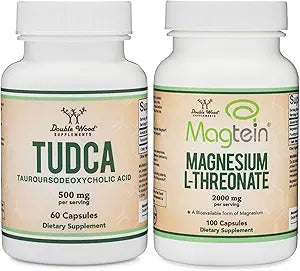
 Instagram
Instagram
How Long Does it Take For Magnesium Supplements to Work?


Related products
Magnesium, a vital mineral, plays a crucial role in numerous bodily functions, including muscle and nerve function, blood glucose control, and blood pressure regulation. According to Dr. Emily White, an expert in nutritional sciences, "Magnesium is involved in over 300 biochemical reactions in the body, making it essential for maintaining health." Despite its importance, magnesium deficiency is not uncommon, leading many to turn to supplements.
Common reasons for magnesium supplementation include correcting deficiencies, improving bone health, and alleviating symptoms like muscle cramps and sleep disturbances. However, it's imperative to understand the efficacy and safety of magnesium supplements, as Dr. White notes: "While beneficial, magnesium supplements must be used judiciously to avoid adverse effects."
This article delves into various aspects of magnesium supplementation: from types and recommended dosages to factors influencing its effectiveness and potential side effects.
How Long Does it Take For Magnesium Supplements to Work?
The time it takes for magnesium supplements to start working varies depending on the individual and the specific health issue being addressed. Generally, some immediate effects, such as improved bowel regularity or relief from constipation (especially with forms like magnesium citrate), can be noticed within a few hours to a few days.
For other benefits like reduced muscle cramps, improved sleep quality, or relief from anxiety, it might take a few weeks of consistent use to notice improvements. Long-term benefits, such as enhanced bone health or cardiovascular benefits, may require several months of consistent supplementation.
It's important to remember that individual factors like age, dietary habits, overall health, and the type of magnesium supplement being used can influence these timelines.
Understanding Magnesium Supplements
Magnesium supplements are available in several forms, including magnesium citrate, magnesium oxide, and magnesium chloride. Each type offers unique benefits. For instance, magnesium citrate is known for its high bioavailability and is often recommended for constipation relief, while magnesium oxide is typically used for deficiency due to its high magnesium content.
However, these benefits come with caveats. As Dr. John Harris, a gastroenterologist, points out, "Magnesium citrate may cause diarrhoea in some individuals, while magnesium oxide can lead to abdominal cramping."
Recommended dosages vary based on factors like age, gender, and health condition. Generally, supplements are available in pill, powder, and liquid forms, catering to different preferences and absorption rates.
Factors Influencing Absorption and Effectiveness
The effectiveness of magnesium supplements is not uniform for everyone. Factors such as age, gender, and existing health conditions play a significant role in how the body absorbs and utilises magnesium. For example, older adults may have reduced absorption efficiency, as highlighted by gerontologist Dr. Lisa Thompson: "Aging can decrease stomach acid levels, impairing magnesium absorption."
Dietary habits and lifestyle choices, such as alcohol consumption and high caffeine intake, can also affect magnesium levels. Furthermore, magnesium interacts with various medications, including diuretics and antibiotics, which can either increase or decrease its effectiveness.
Timeline for Magnesium Supplement Effectiveness
Understanding the timeline for magnesium supplement effectiveness is critical. Initially, some individuals may notice immediate effects like improved bowel regularity, especially with magnesium citrate. However, as cardiologist Dr. Mark Allen states, "For cardiovascular benefits, such as reduced blood pressure, it might take weeks to months of consistent use."
Short-term effects, usually observed within the first few weeks, can include improved sleep quality and reduced muscle cramps. Over months of consistent use, long-term benefits like better bone health and reduced risk of chronic diseases may become evident.
Recognizing Signs of Improvement
Recognising the signs of improvement is key to assessing the effectiveness of magnesium supplements. Physical signs of improvement include reduced frequency of muscle cramps and better overall sleep quality. Psychological benefits, such as improved mood and reduced symptoms of anxiety, are also notable.
Dr. White advises, "Keeping a symptom diary can be a helpful way to track changes and discuss them with your healthcare provider."
Potential Side Effects and Overdose Risks
While magnesium supplements are generally safe, they can cause side effects, particularly when taken in high doses. Common side effects include diarrhoea, nausea, and abdominal cramping. In extreme cases, magnesium overdose can lead to serious complications such as irregular heartbeat and low blood pressure.
Dr. Harris warns, "It's crucial to adhere to recommended dosages and consult a healthcare provider, especially if you have kidney issues, as they can increase the risk of magnesium toxicity."
Integrating Magnesium Supplements into Your Routine
Integrating magnesium supplements into one's routine should be done thoughtfully. Best practices include taking supplements with meals to enhance absorption and considering the timing – for instance, taking magnesium in the evening may aid in sleep.
The role of diet in magnesium absorption shouldn't be underestimated. Foods rich in magnesium, such as nuts, seeds, and green leafy vegetables, can complement supplementation. Dr. Thompson suggests, "A balanced diet, along with supplements, ensures optimal magnesium levels."
Consulting healthcare professionals is vital for personalised advice, particularly for individuals with specific health conditions or those taking other medications.
Conclusion
In conclusion, magnesium supplements can be a valuable addition to many individuals' health regimens. However, it's important to approach supplementation informed and cautiously, understanding the types, dosages, and potential interactions. Consulting healthcare professionals and considering individual health needs and lifestyles are essential for safe and effective use of magnesium supplements.























 Rated Excellent by 26,523+ Reviews
Rated Excellent by 26,523+ Reviews